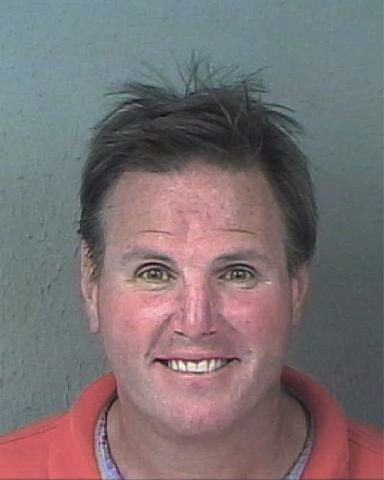
A man turned down for permits to house his chimpanzees in both Nye and Clark counties in the last year was arrested in Florida last month for allegedly attempting to illegally sell his animals.
James “Mike” Casey, 50, was arrested on July 10 in Hernando County, Fla., after an investigator with the Florida Fish and Wildlife Conservation Commission discovered Casey allegedly didn’t have the proper permits to possess three chimpanzees in his custody, nor did he have the proper labeling on his vehicle or proper carriers to transport the animals through the state.
In the state of Florida, chimpanzees are considered class one wildlife, which according to the Florida Fish and Wildlife “are those that pose a significant danger to people. Substantial experience and specific cage requirements must be met.”
He was subsequently arrested and taken into custody on charges related to the unlawful possession of three adult chimpanzees over 50 pounds. The van used to transport the animals was not properly labeled amd transport carriers were not of required strength and material. Also, Casey was charged with not having proof of liability insurance and/or a surety bond as required.
The chimpanzees in his custody were seized and placed in a Florida primate sanctuary.
Casey was denied a permit to house the animals on a 2.5-acre property in Clark County in December and told to remove the animals from the area permanently.
He then moved the chimps to a property located at 2721 Our Road in Pahrump and in May applied for a conditional use permit to house the animals here in Nye County as part of his business, “A Great Ape Experience.”
The company reportedly allowed people to hire the chimpanzees for commercial appearances at birthday parties, corporate events and other activities.
A report prepared before a May 15 Pahrump Regional Planning Committee meeting recommended the permit be turned down as it stated he hadn’t been licensed to house the animals on the property by the United States Department of Agriculture prior to moving there and the property was within 700 feet of other residential homes, which could put neighbors in danger if the chimpanzees escaped.
Additionally a report from Nye County Animal Control noted although food and sanitation conditions on the property were satisfactory, there were still concerns about public safety in regard to the chimpanzees’ enclosure and how they would be transported. At the July RPC meeting, Casey’s request for a permit was ultimately denied.
Members of the organization People for the Ethical Treatment of Animals also protested Casey’s permit request, telling RPC members the applicant was a notorious animal abuser.
Brittany Peet, a PETA lawyer, said Wednesday that Casey has a long history of abusing his chimpanzees including instances where he has reportedly hit them or thrown hot tea on them when they misbehave.
“No matter what happens with the current charges, the chimpanzees whose names are Hannah, Kenzie and Bentley, should never go back to Casey,” she said.
Peet said the three chimpanzees seized by Florida Fish and Wildlife are currently being held at the Sun Coast Primate Sanctuary in Florida. PETA would ultimately like to see them rehomed at a North American Primate Sanctuary Alliance accredited facility, she said.
“We’ve arranged for a NAPSA accredited sanctuary to take in Hannah, Kenzie and Bentley and provide them with the lifetime care and rehabilitation they need after all they’ve been through. Chimpanzees who’ve been abused and neglected as severely as these three chimpanzees often actually suffer from PTSD, depression, or other psychological disorders. So we’re urging FWC to allow them to go to a sanctuary that’s experienced in treating those conditions,” she said.
Although the group has made arrangements for an accredited institution to receive the animals, Peet said it is still in the hands of the conservation commission.
“We’re applauding FWC for arresting him and seizing the chimpanzees, but we’re really just at this point calling on FWC to take this opportunity to change their lives by transferring them to a NAPSA accredited sanctuary where they can be rehabilitated and socialized into a new group and not forced to languish in cramped cages in a roadside zoo, but we’re still at that preliminary stage at this point,” she said.
Peet said PETA hopes Casey will be convicted of the four misdemeanor charges against him and sent to jail for the maximum amount of time on each count.
“We hope that he will be convicted of these four misdemeanor charges and we hope he will serve the maximum sentence, which we believe is 60 days in jail and a $500 fine per violation. But ultimately we hope that Hannah, Kenzie and Bentley will be allowed to retire to a NAPSA accredited sanctuary where they can be rehabilitated,” she said.
As of Wednesday Casey was no longer listed in custody at the Hernando County Sheriff’s Office.